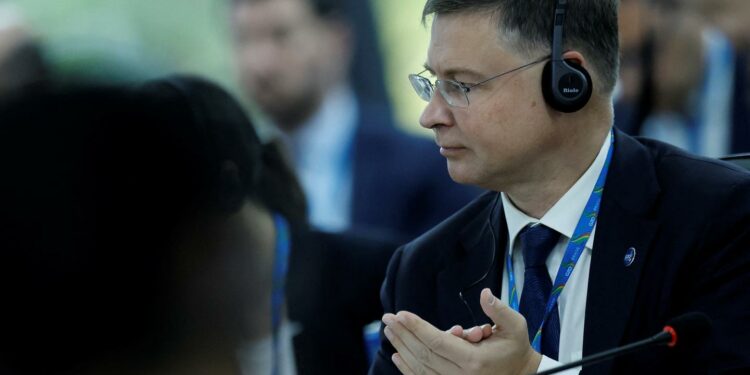Since this past summer, there have been renewed rumblings within European Union (EU) institutions that the trade agreement between the EU and Mercosur, the South American trade bloc including Argentina, Brazil, Uruguay, Paraguay and Bolivia, could soon be concluded. Some even imagine that the announcement could be made at the next G20 summit, in Rio de Janeiro (Brazil) on November 18 and 19. Yet this issue has, for more than 20 years now, regularly disrupted French politics.
In recent days, discussions between the Commission, which negotiates on behalf of the EU’s 27 member states, and the Mercosur countries have intensified. Furthermore, on Wednesday, October 23, Trade Commissioner Valdis Dombrovskis visited Brazil, where he is due to meet several ministers from the Mercosur zone between now and Friday, October 25.
For French Prime Minister Michel Barnier, the timing couldn’t be worse: Barnier is already struggling to finish the 2025 budget, and virtually all of France’s political parties, from the far-right Rassemblement National to radical left La France Insoumise, are opposed to an agreement with Mercosur. Barnier, a former EU commissioner and minister of agriculture, knows just how explosive the subject is, and the French farming unions have taken it upon themselves to remind him, after announcing on Tuesday, October 22 a new national mobilization starting in mid-November. Arnaud Rousseau, the president of the Fédération Nationale des Syndicats d’Exploitants Agricoles (“National Federation of Farmers’ Unions”), took this opportunity to point out that the EU-Mercosur agreement represented a “red line” for his base.
In the fall of 2023, the Commission had thought that the agreement was within reach and hoped to celebrate the event at the Mercosur summit in Rio de Janeiro on December 7, 2023. Dombrovskis and Ursula von der Leyen, the Commission president, had even planned to fly to Brazil, should the meeting prove successful. However, in Paris, Emmanuel Macron once again voiced his categorical opposition, while in Buenos Aires, the outgoing Argentinian president Alberto Fernandez ultimately chose to leave the matter to his successor, Javier Milei, who had just been elected but had not yet taken office.
Germany has changed course
“We’ve lost count of how many times we’ve been told we’re on the verge of an agreement with Mercosur,” said an unworried Macronist source. In 2019, the Commission came close to success, but amid growing public opposition to free-trade treaties, the signed agreement was never ratified. France was the first to oppose it; Germany, sensitive to sustainable development issues, eventually followed suit.
You have 59.7% of this article left to read. The rest is for subscribers only.
Source link : http://www.bing.com/news/apiclick.aspx?ref=FexRss&aid=&tid=671cdaf67e8d48c7b72f13ade5decc73&url=https%3A%2F%2Fwww.lemonde.fr%2Fen%2Feconomy%2Farticle%2F2024%2F10%2F26%2Feu-mercosur-agreement-negotiations-speed-up-to-france-s-dismay_6730586_19.html&c=16197710061162394108&mkt=de-de
Author :
Publish date : 2024-10-26 04:00:00
Copyright for syndicated content belongs to the linked Source.


